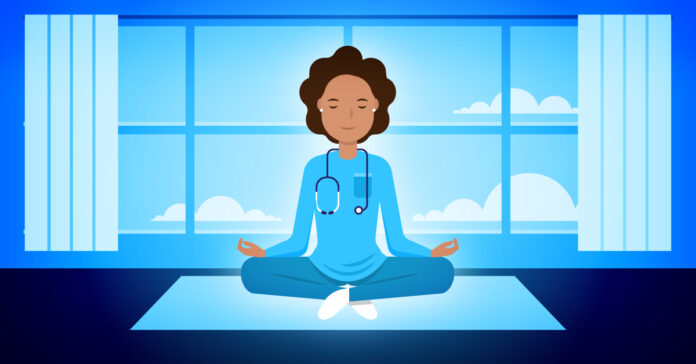Being a nurse is an often challenging profession. The demanding hours, high-pressure situations, and emotional toll can lead to burnout if not effectively managed. That’s why nurses must incorporate mindfulness techniques into their routines. By doing so, they can reduce stress, enhance well-being, and overcome burnout. This blog post will explore mindfulness techniques nurses can practice to maintain their emotional equilibrium and mitigate nurse burnout.
Deep Breathing Exercises
Breathing is a potent technique that can instantly soothe the mind and relax the body. For nurses, this technique can be performed anywhere – during a break before a challenging procedure or even while stuck in traffic on the way to work. Taking a few minutes to concentrate on rhythmic breaths can lower stress levels, improve concentration, and provide a sense of tranquility amidst the chaos. Practicing breathing exercises is one of many ways individuals can overcome nurse burnout.
To practice breathing, find a sitting or standing position with your feet firmly planted on the ground. Close your eyes gently. Take deep breaths through your nose, allowing your abdomen to expand as you inhale fully. Then, exhale slowly through your mouth while feeling any tension released from your body. Repeat this procedure, allowing yourself to be fully present in the moment.
Mindful Eating
Nurses are frequently busy due to patient care responsibilities and need more meal time. Mindful eating is a technique that encourages individuals to focus on the eating experience, including the taste, texture, and aroma of the food. By practicing eating, nurses can slow down and fully appreciate their meals, leading to increased satisfaction and reduced stress levels.
To practice mindful eating, set aside time for meals without any distractions. Pay attention to each bite. Take note of the flavors, textures, and smells of the food. Chew slowly and relish every mouthful. By eating, nurses can feel gratitude for nourishing their bodies, which enhances mindfulness and overall well-being.
Guided Imagery
Guided imagery is a relaxation technique that uses images to promote relaxation and alleviate stress. Nurses can use guided imagery to mentally transport themselves to serene environments even if they cannot now. This technique can be particularly beneficial to unwind and recharge during breaks or before bed.
To practice guided imagery, find a comfortable space where you won’t be disturbed. Close your eyes gently and take a deep breath as you center yourself. Then, picture yourself in a peaceful location. It could be a beach, a tranquil forest, or a serene garden. Imagine this place’s sights, sounds, and fragrances as you fully immerse yourself in its tranquility. Stay in this sanctuary for as long as you need to feel restored and rejuvenated.
Progressive Muscle Relaxation
Progressive muscle relaxation is a technique that involves tensing and then releasing each muscle group to induce relaxation. This method can assist nurses in relieving tension and alleviating symptoms of stress, such as muscle tightness and headaches.
To practice muscle relaxation, find a position and close your eyes. Starting from your toes, gradually tense each muscle group in your body, and for a few seconds, release the tension to allow the muscles to relax fully. Proceed upward through your legs, torso, arms, and face, repeating this process for every muscle group. You can experience a sense of relaxation and tranquility by relaxing your muscles in this manner.
Mindful Reflection
Mindful reflection is an exercise that enables nurses to process and release the challenges and emotions they encounter during their shifts. By engaging in introspection, nurses can gain insights into their experiences, foster self-awareness, and develop effective strategies for managing stress and avoiding burnout.
To incorporate reflection into their routine, nurses should allocate a few minutes at the end of each shift to contemplate their experiences. Find a comfortable space, close your eyes, and take a series of breaths. Allow your mind to revisit the events and interactions of the day without passing judgment or becoming attached to them. Take note of any emotions, thoughts, or sensations that arise and simply observe them. Nurses can release negativity or accumulated stress from the day through judgmental awareness.
Conclusion
Integrating mindfulness techniques into their practice can significantly benefit nurses by reducing stress, promoting well-being, and preventing burnout. By dedicating time to breathing exercises, eating habits, guided imagery sessions, progressive muscle relaxation techniques, and mindful reflection exercises, nurses can maintain mental and emotional equilibrium, providing optimal patient care. So, embrace mindfulness as a part of self-care – you and your patients will reap its rewards.

